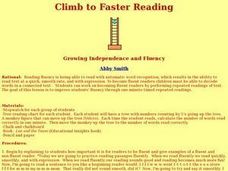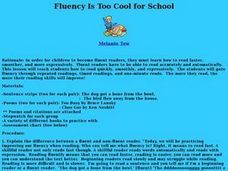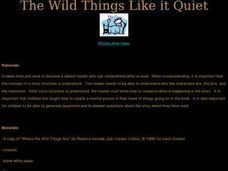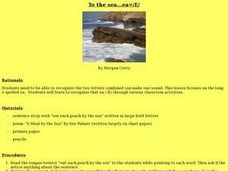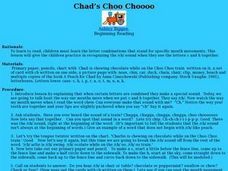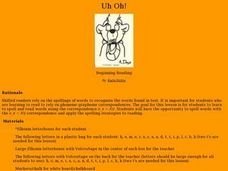Curated OER
Watch Out Books! I'm Reading with Expression!
Learners discover how to read with expression. By reading and rereading decodable words in connected texts, students study the importance of expressions and how it can make a book more enjoyable.
Curated OER
Applying SQ3R to Texts
After a review of the SQ3R strategy, readers use the provided prompts to respond to a text. The value of this worksheet is in the additional questions that move the learner into higher levels of reasoning.
Curated OER
Research Listed Websites for Support for Writing a Summary
Summary writing is tough for native English speakers, let alone English language learners! In this plan, high school English learners examine how to annotate online articles and write a one-page summary. They can post this summary on...
Curated OER
I am Special and You are Special Too - Project Children L.E.A.D.
Eighth graders recognize what makes them special through class participation and discussion of rap music, writing a poem about themselves, and designing their own special hat while working in groups.
Curated OER
Alexander said Achoo
Alexander asked for ashy amber apples! Have your young learners practice the /a/ sound with this tongue twister. Then learners will write the letter and participate in a book talk for A Cat Nap. Can they identify the target...
Curated OER
Sssssssss
Students experience the strategy of phoneme recognition to recognize /s/ in spoken words, including plurals, and in writing. They encounter the book Summer Fun by Lucy Lawrence and the tongue twister "Miss Sam saw a sneaky slimy snake in...
Curated OER
Icky Insect Is In Icky Sticky Ink
Practice the strategy of letter-sound correspondence when identifying the short vowel /i/ sound in written and spoken words. The teacher recites the tongue twister "Icky insect is in icky sticky ink," while listeners repeat. Letter boxes...
Curated OER
Ready...Set...Go!!
Readers work to increase their reading fluency through repeated timed readings. They learn to read with more excitement and enthusiasm in their voices, making a more pleasurable experience for their listeners.
Curated OER
Reread for Speed
Increase reading fluency! Through repeated readings, emerging readers increase their ability to read with more excitement and enthusiasm in their voices, making a more pleasurable experience for their listeners. They complete timed...
Curated OER
Kites are Slow, Reading is Fast
Speed read with your third, fourth, and fifth graders. Learners pair up and work together to improve their oral fluency. Use the technique of covering up unknown words to isolate the vowel and decode the word. There's a sheet included to...
Curated OER
Climb to Faster Reading
Students participate in repeated reading activities to improve their fluency after listening to the teacher model fluent and non-fluent reading. They work with a partner to complete repeated reading of sentences and books while being...
Curated OER
Fluency Is Too Cool for School
What does a successful reader sound like? Help readers gain fluency and become successful readers through repeated readings of given poems. They use the cover-up method to help them decode new words and chart their progress as they...
Curated OER
Summarization Superstars
How do you read when you know you're going to be summarizing a text? Summarize a nonfiction text with your upper elementary schoolers. Your pupils independently read a nonfiction article and write a summary paragraph using the six-step...
Curated OER
The 5 W's
Examine how to answer who, what, when, where, and why when reading text. Young writers listen to the story Skeleton Hiccups, and as a class answer and discuss the five W's. Independently they read the story silently, and write the...
Curated OER
The Wild Things Like it Quiet
Students read Where the Wild Things Are by Maurice Sendak. They visualize what is happening in the book and then identify the main points of the story. Students write a summary of the book and draw a picture of what they visualized...
Curated OER
I Scream You Scream We All Scream for Ice Cream!
Use letter boxes and example words to help kids distinguish between the sounds for short vowel e and long vowel e. They are introduced to the vowel patterns that comprise long vowel sounds, with a particular emphasis on /ea/. They...
Curated OER
Aches and Pains
Being able to distinguish between short and long vowel /a/ sounds is an important skill for young readers. They are introduced to the vowel-consonant-e pattern that changes short vowel sounds into long vowel sounds. They practice reading...
Curated OER
To the Sea
Improve pronunciation and phonemic awareness in your first and second graders! With this plan, they distinguish between the sounds for short vowel e and long vowel e. They are introduced to the vowel patterns that comprise long vowel...
Curated OER
Chad's Choo Choooo
Choo, choo! Do your youngsters like trains? After studying the target sound, have your learners read A Peach for Chad. Do a class read and an independent read to increase fluency. At the instructional activity's close, consider...
Curated OER
Uh Oh!
Help your elementary learners distinguish between short and long vowel /o/ sounds. They are introduced to the vowel-consonant-e pattern that changes short vowel sounds into long vowel sounds. Then they practice reading and spelling words...
Curated OER
Fire! Fire! Fire!
The book Play Ball, Amelia Bedelia, is read with quickness and fluency in this instructional activity. The teacher models slow, choppy oral reading, and then smooth, quick, and fluent oral reading. Then, pupils read orally with a...
Curated OER
Give Me Some Expression!
Work to improve oral expression while reading aloud. Young scholars read sentence strips, changing their volume, speed, and tone to match what is written, making the sentence more meaningful. They read an entire story with a partner who...
Curated OER
Yay for Expression!
Review the concept of expressive reading. Through modeling, the teacher shows them that more expression makes reading more interesting and enjoyable to listen to. They review ending punctuation marks and the types of expression and...
Curated OER
Bouncing Pig
First graders practice discerning between the lowercase letters p and b. Through hands on and listening activities, they recognize the difference between the commonly confused letters b and p. They practice writing both letters and...












